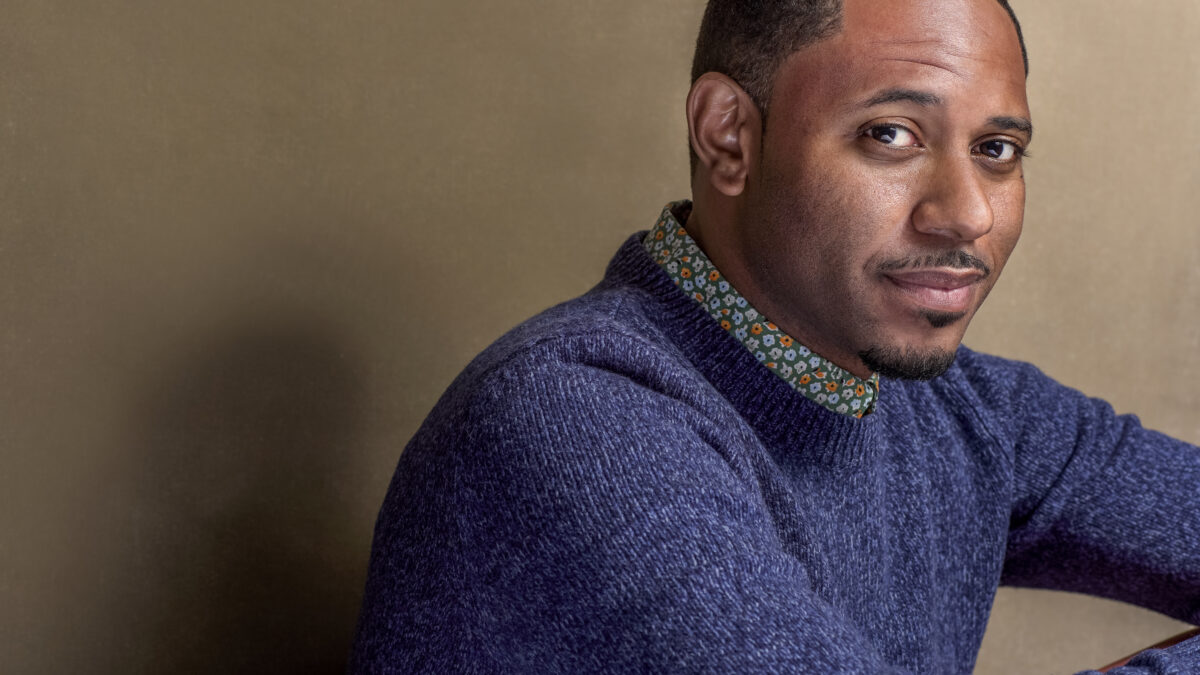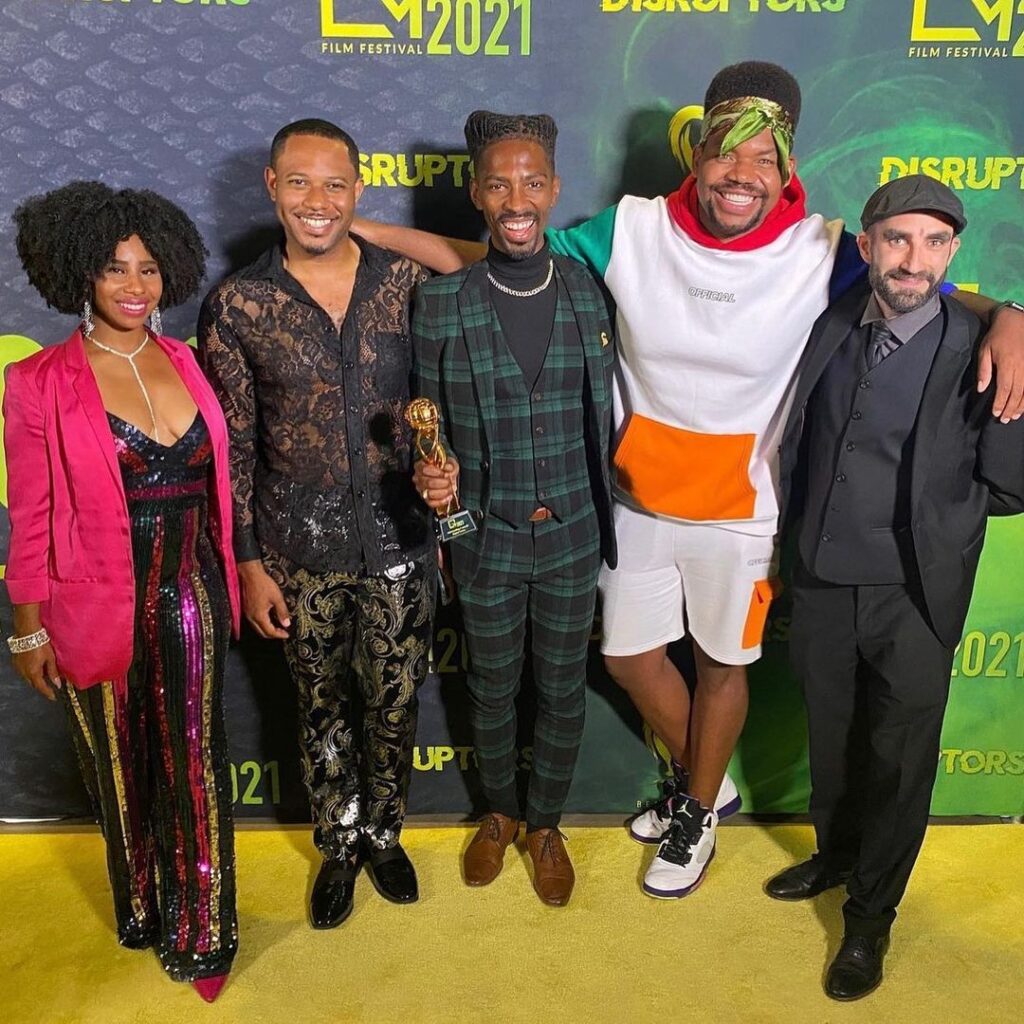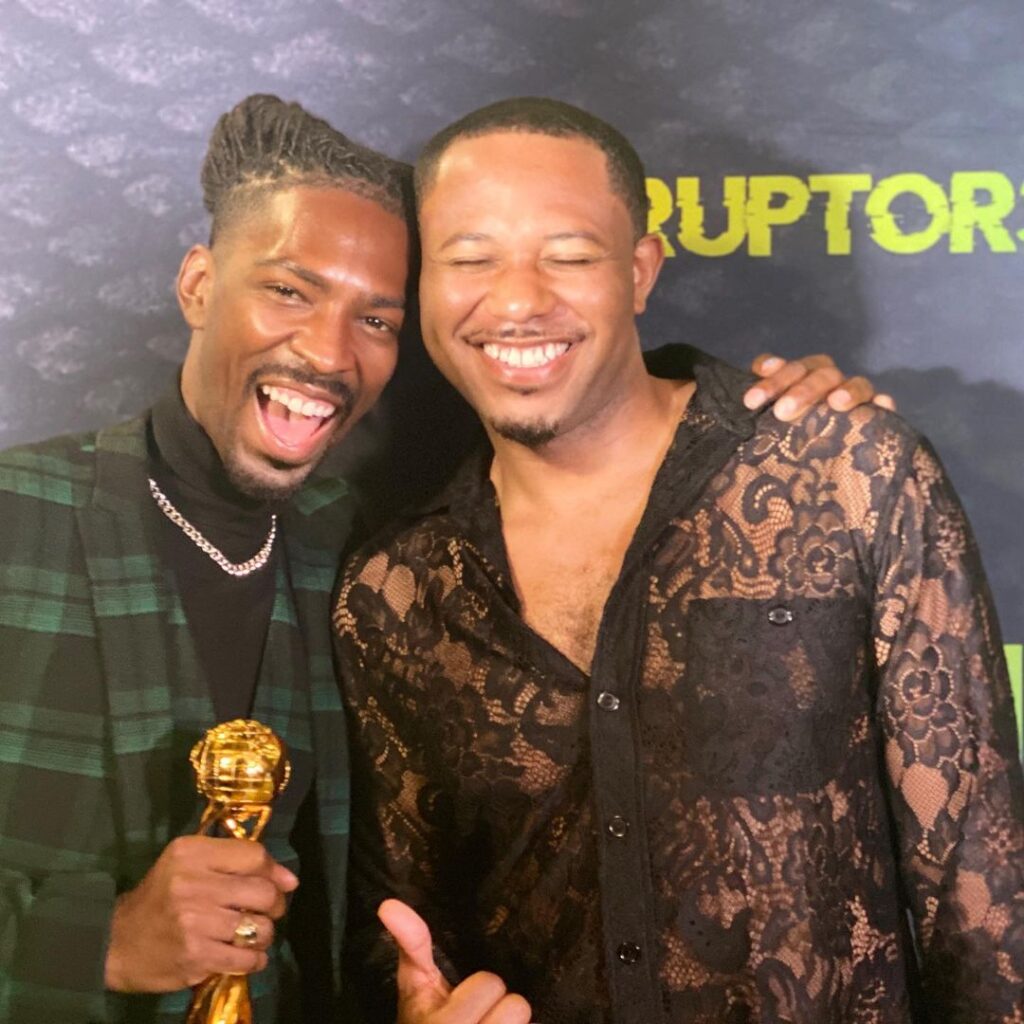
Larry Powell (Photo by Lelund Durond Thompson)
When USC School of Dramatic Arts faculty member Larry Powell began writing The Gaze…No Homo, he had been turning down television and film opportunities in favor of live theatre for 10 years. But by the end of 2018, he found himself disillusioned with unfair wages and the colonization of the proscenium.
“I was often in plays that were slotted as Black History Month plays, or even as ‘the Black one’ in a play that’s not a Black play. … I was often exploring my Black experience in front of audiences that didn’t look like me and that did not have my experience,” Powell said. “Then there’d be a student matinee or a Black theatre night, or a Sunday where people were coming home from church and I felt like, ‘Oh, this is why I do what I do.’ It became confusing for me.”
Powell worked with grassroots movement Fair Wage Onstage to help advocate for equitable wages for actors. But the hurdles specific to the Black experience were deeply systemic, rooted even behind the curtain.
“Then there were the ways in which the audiences offstage or my collaborators in the room who weren’t of my experience were enacting or propagating certain systemically racist actions, slurs…it became really overwhelming for me,” he said. “I started to turn away plays. I went through a short season of saying ‘no’ … and it was really hard.”
As 2019 began, Powell found himself at the Lark Play Development Center’s inaugural Los Angeles Writers’ Retreat. There, Lark founder John Clinton Eisner told Powell and the other writers to “write the play that scares you the most”; he went home that evening ready to create.
“Jerome started to pour out of me … by the end of that week-long retreat I had the first draft of No Homo,” he said.
First iterations
Next came several readings of No Homo at friends’ homes, first in Los Angeles, then in New York. The overwhelming response included several questions about what happened next for Jerome, the play’s central character.
“I was fed by it, and kept going, and found myself having this big long play: three plays in one,” Powell said. “Galen was one of the first people that I sent it to.”
SDA alum Galen J. Williams MFA ’21 read the play while traveling with his cohort. The two had met previously through Williams’ older brother, but after Powell directed Williams in that year’s MFA Year 2 production, they formed a strong working relationship.
“It wasn’t until The Brothers Size at USC that we worked together in that collaborative capacity…that intimate rehearsal space was the bonding glue of our relationship. When he first brought The Gaze to me, I was blown away by this play,” Williams said.
The two even worked together to name all three sections: while No Homo was just the first in the trilogy, The Gaze felt right as a universal title.
Adapting for 2020
Once all three plays were drafted, Powell held a professional reading at Greenway Court Theatre in Los Angeles, directed by Zhailon Levingston and produced by Angelica Robinson. He began conversations with a few theatres about staging the play, and was even accepted to the Eugene O’Neill National Playwrights Conference as a finalist. When the pandemic hit and live theatre paused, conversations around the topic grew deeper amongst the Black Lives Matter movement.
“Conversations started to happen around the old conversation of inequity in the theatre and entertainment space, and I was like ‘I have something to say,’” Powell said.
Powell and Devere Rogers, who plays Shaun Corey in No Homo, began to talk about adapting The Gaze into a series, and Powell contacted Robinson about the shift. They jumped in, and The Gaze quickly became one of the first digital series to get approvals from SAG, preparing to shoot entirely remotely.
“I just adapted my play to this form. No script was frozen, so everyone helped, and it was just this wonderful moment of uber-collaboration. It was a very involved and inclusive process,” Powell said.
The team shot all 12 episodes in 12 days, from all over the country. Williams played the role of Jerome, anchoring the series from Atlanta, where he was staying during the pandemic. After a virtual semester, he found the challenge of adapting The Gaze to Zoom a welcome reframing of the task. It allowed him to use the screen to his advantage.
“Having to create that impactful, meaningful, powerful work through these devices was everything I needed to prove that the screen isn’t a boundary; it’s a tool,” he said. “It’s a different medium … it made me excited for my last year of school online.”
Making space and moving forward
Powell felt comfortable working with Williams remotely, especially because of their time spent together on The Brothers Size. Their relationship allowed efficiency but also connection across the Zoom screen.
Because the premise of The Gaze itself discusses a toxic creation process, Powell worked hard to build the antithesis behind the screen: a compassionate, collaborative space. That’s why the recognition means so much to Powell and the many hands that worked on the digital series. The Gaze…No Homo was nominated for two Daytime Emmys: “Outstanding Multiple Camera Editing for a Drama or Daytime Fiction Program” for editor Joey Scoma, and “Outstanding Lead Actress in a Daytime Fiction Program” for Sharon Lawrence. It also won “Outstanding Digital Series” at the 2021 Micheaux Film Festival, among four other nominations, and “Video – Diversity & Inclusion (Video Series & Channels)” at the 2021 Webby Awards.
“Having to create that impactful, meaningful, powerful work through these devices was everything I needed to prove that the screen isn’t a boundary; it’s a tool.”
— Galen J. Williams MFA ’21
“This is what it truly means to fight on … we really wrestled with possibility and with technology. It can deepen the connection: we were all able to come together and tell a story,” he said.
The next step for The Gaze could take many forms: the digital series is a high-quality, innovative proof of concept and has allowed Powell to redraft the the play, ready for a live production. For Powell, this work is moving toward a future where Jerome doesn’t have to fight so hard, and where his struggle for equity isn’t the only thing we see.
“It’s always reaching towards that space of radical liberation where there’s no need for Black pain to be the proxy by which we get a good story,” he said. “It takes a certain type of artist, of fighter, to say ‘I will rise for that.’ The world that you know now must be disrupted in order for you to have the future you’re dreaming of.”
The Gaze…No Homo is available to stream online at www.thegazeseries.com.

